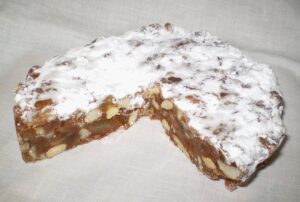Since the first phalanx of holiday bakers will attack the stove this weekend, we’d better have a conversation about fruitcake.
Fruitcake, according to what I read, is making a comeback among Americans who never experienced it growing up. The key words here are “never experienced it,” for if you grew up with the fruitcake of my day, well, this conversation is already slanted in a certain direction.

Fruitcake in my childhood was mail-ordered from Collin Street Bakery in Corsicana, Texas. It was a fragrant, heavy loaf that significantly fueled the economy of Corsicana. My mother loved it with black coffee (the core food in her diet). My dad ate it with gusto, although not quite as ardently, also with black coffee. Its presence on the coffee table signaled that the Christmas season was nigh. I personally found it horrid, but my palate was narrow growing up.
Fruitcake is not limited (as I thought) to a single bakery in Texas. It is a world-wide phenomenon, and highly respected. Here in the US, though, there are as many fruitcake jokes as elephant jokes. They tend to be short, harsh, and filled with a certain truth, for example:
When is a fruitcake like a golf ball?
When it’s been sliced.
or
Unbeknown to most theologians there was a fourth Wise Man who was turned away for bringing fruitcake.
Of course, there is the phrase “nuttier than a fruitcake” as well as this classic line attributed to the beloved deacon of late-night comedy, Johnny Carson (1925-2005):
There is only one fruitcake in the entire world, and people keep sending it to each other.
My denigrating of fruitcake stopped when my life expanded abroad. Our American fruitcake had glorious cousins all over the world, starting with the German fruitcake known as the Königskuchen or King Cake. Now this is not the Three-Kings’ Cake we read about at Mardi gras where a doll of Baby Jesus is hidden in the dough. (What a strange thing to do, right?) This is an elegant, not overly sweet, dry cake, with fruit, nuts, some of which are soaked in spirits, and baked in a long loaf pan specific to the cake.
Then there are famous German Stollen, the best being the Christstollen from Dresden. These are dense yeast breads baked with dried fruits, candied citrus peel, nuts and spices. Sometimes they contain almonds, poppy seed, that strange but wonderful dairy product called quark, and marzipan. Inevitably they are dusted with confectionary sugar symbolizing the iconic snowscape so desirable at Christmas.

The Italian Panforte (literally strong bread) catches the eye, associated with the region of Tuscany and famous for its flat shape, taste, and texture somewhere between an almond-rich Florentine and a gingery Lebkuchen. Even better known is the elegant Italian Panettone, dotted with rum-soak dried fruit, citrus, and almonds. This one requires dedication to make, needing a first day to make the dough followed by at least eight hours to rise in the refrigerator, and then a second day to finish rising to its admirable height before baking.
The French too have their versions of fruitcake, boasting candied orange peel, walnuts, and raisins, as do most countries across Europe. Fruitcakes abound beyond Europe, too, including in India with a famous one from Kerala (the thirteenth largest state in India with 33 million) called the Kerala Plum Cake. The recipe is easy to find online, features a caramelized bottom, and it seems like something an ordinary person like me could actually bake.
We like for our topics to have “Classical” roots around here, and you’ll be happy to know that fruitcakes have them. The Romans seem to have made a mash of fruitcake-like ingredients that sounds rather like an oblong energy bar. Fruitcakes are well documented in the Medieval period, and showcased in pieces of literature across the centuries, including a famous 1956 story by Truman Capote called A Christmas Memory.
Up through the 19th century, fruitcakes were standard fare at many types of celebrations, especially weddings. Then, sometime in the 20th century, fruitcakes acquired their association in America largely with Christmas. And while they may be an acquired taste, and indeed are more for grownups than children, the appearance of the fruitcake still marks a significant stage of the Christmas season’s drama.
I looked for international jokes about fruitcakes similar to those we have here. I found one about two raisins coming out of a German Königskuchen, but it defied translation. Better than jokes, though, is a funny event that really happens in Manitou Springs, Colorado: the Great Fruitcake Toss. Yes, at this festival, leftover or unwanted fruitcakes are dispatched using a Medieval weapon—the catapult.
The festive day includes different events judged by hand-toss distance, accuracy, speed, and balance. This year, it’s set to begin on January 22, 2022 which apparently has also been designated National Fruitcake Toss Day. You cannot make this stuff up.
So, no matter what challenges you at the moment, close your eyes, sit back, and make your imaginary choice: would you rather bake one of these delectable, traditional seasonal treats? Or trek to Colorado in January to join the fruitcake toss? Either way, you are likely to smile.



